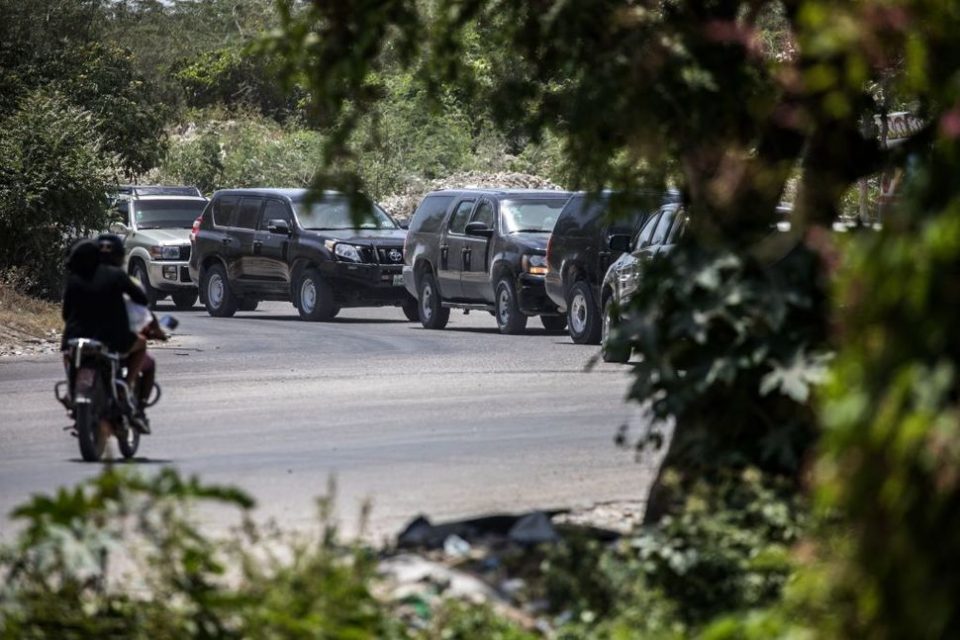A delegation of U.S. officials arrived in Haiti on Sunday at the request of the local government to help mitigate the fallout following the assassination of Haitian President Jovenel Moise last week amid new reports a Haitian-born Florida-based doctor hired the hit squad to help install himself as leader.
The White House confirmed Monday morning that officials from the departments of Homeland Security, Justice and State as well as from the National Security Council have met with the interim leaders of the impoverished country – including acting Prime Minister Claude Joseph – and are beginning to provide security and investigative assistance at the request of the government in Port-au-Prince.
“In all their meetings the delegation committed to supporting the Haitian government as it seeks justice in this case and affirmed the United States’ support for the people of Haiti in this challenging time,” National Security Council spokeswoman Emily Horne said in a statement. “The United States stands with Haiti in becoming a safer, more democratic country.”
Photos You Should See – July 2021
Police in Haiti identified two Haitian-Americans arrested for their involvement in the assassination – James Solages and Joseph Vincent – with Haitian National Police Chief Leon Charles announcing Sunday the arrest of another American, Christian Emmanuel Sanon, whom local authorities say hired the mercenaries to remove Moise in a plot to become president.
“He arrived by private plane in June with political objectives and contacted a private security firm to recruit the people who committed this act,” Charles said.
The other two Americans who were arrested say they were not in the room when Moise was killed in his residence on July 7 by a group of heavily armed men, and were acting only as translators for the assassination team. They say they understood the goal of the operation as only to kidnap the president and bring him to the national palace, not to kill him.
Experts from the U.S. and Colombia are contributing to the investigation into the killing of Moise, carried out by at least three Haitian-Americans and 26 Colombians. Seventeen of them have been captured, three were killed in a shootout with police and eight remain at-large, Haitian police say. One of the apparent mercenaries who was killed had previously been hired as a bodyguard, members of his family told reporters.
The principal goal for the visiting U.S. delegation is to encourage unity among leading politicians and push them toward what Horne described as “a political accord that can enable the country to hold free and fair elections.”
However such aspirations are likely out of Haiti’s reach, at least in the near future, analysts say.
The poorest country in the Western Hemisphere, Haiti has been rocked by a series of disasters in recent years, including an earthquake in 2010 that killed 250,000 people, crippling its infrastructure which remains decimated.
The Caribbean nation saw dramatic democratic backsliding under the rule of Moise. The entrepreneur-turned-politician came to power in 2017 following a contested election the year before and had increasingly exerted dictatorial control, including overseeing the formation of a secret intelligence service answerable only to him and the arrest of senior officials such as a judge on the country’s supreme court.
The new American delegation’s goals match those of other international institutions pressing Haiti to return to democratic processes, which do not appear to account for the stark realities on the ground.
“Haitian civil society organizations note that food insecurity, political violence, and the pandemic ensure that voting would be far from free and fair,” according to an analysis note by the Council on Foreign Relations’ Paul J. Angelo and David Gevarter. “Instead, they have Haitian National Police Chief Leon Charles advocated for a non-partisan transitional government to oversee the restoration of the constitutional order.”
White House spokeswoman Jen Psaki, who previewed the delegation on Friday, said the U.S. does not currently have any plans to send military assistance to Haiti despite requests from Joseph in a conversation with Secretary of State Antony Blinken last week.


